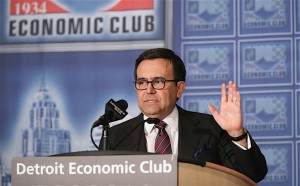
Mexico's top trade official Ildefonso Guajardo said recently he believed NAFTA talks could be done by May.
With the Trump Administration struggling to gain concessions in ongoing North American Free Trade Agreement talks and on the cusp of a trade war with China, the news that Mexico’s auto imports into the U.S. rose 7.5% may only serve to complicate matters.
One of the provisions Trump wanted in a revised NAFTA was fewer exports from Mexico into the U.S. President Trump was also heavily critical of automakers that built vehicles in Mexico and shipped them here, at one point threatening to tax them.
The jump in exports comes despite a production drop of 10.9% in March compared with year-ago figures, auto industry group AMIA said.
Mexico exported 327,955 vehicles last month, up from 304,950 in the same month last year, the group said, while noting that overall production fell to 331,109 units from 371,447 produced in March 2017.
(Trump trade disputes puts automakers in crosshairs. Click Here for the story.)
Fausto Cuevas, AMIA’s director general, said the production drop was due to the Easter national holiday in Mexico. AMIA said domestic car sales totaled 118,600 units in March, down 13.4%. Guillermo Rosales, deputy director of the Mexican association of automobile distributors, attributed the fall to the impact of higher inflation and interest rates on consumers.
Changing the flow of vehicles from the Mexico to the U.S. will be tall order as just under 70% of exports last month went to the United States, with 6.9% headed to Canada, and 12% bound for Latin America, AMIA said.
In spite of that and several other delays, Mexico’s economy minister, Ildefonso Guajardo Villarreal, said he saw an 80% chance of reaching a new NAFTA deal by the first week of May, according to Reuters, but added that conditions were not right for a deal this week.
(Click Here for more on what’s happening with NAFTA.)
The talks have already been hampered by several delays related to automotive provisions in the deal. However, the three sides have been holding side sessions to work through problems with great effectiveness.
The NAFTA negotiations had dominated trade headlines until recently when President Trump began announcing tariffs on steel and aluminum as well as $50 billion in new tariffs on Chinese products. He then doubled down suggesting it could rise to $100 billion.
“Trade barriers must be taken down to enhance economic growth in America and around the world,” Trump said in a statement. Trump has been adamant that the U.S. can win a trade war with China.
(To see more about the potential consequences of a trade war, Click Here.)
According to Trump, after a thorough investigation under section 301 of the Trade Act of 1974, the United States Trade Representative determined that China has repeatedly engaged in practices to unfairly obtain America’s intellectual property. The practices detailed in the USTR’s investigation have caused concern around the world.
